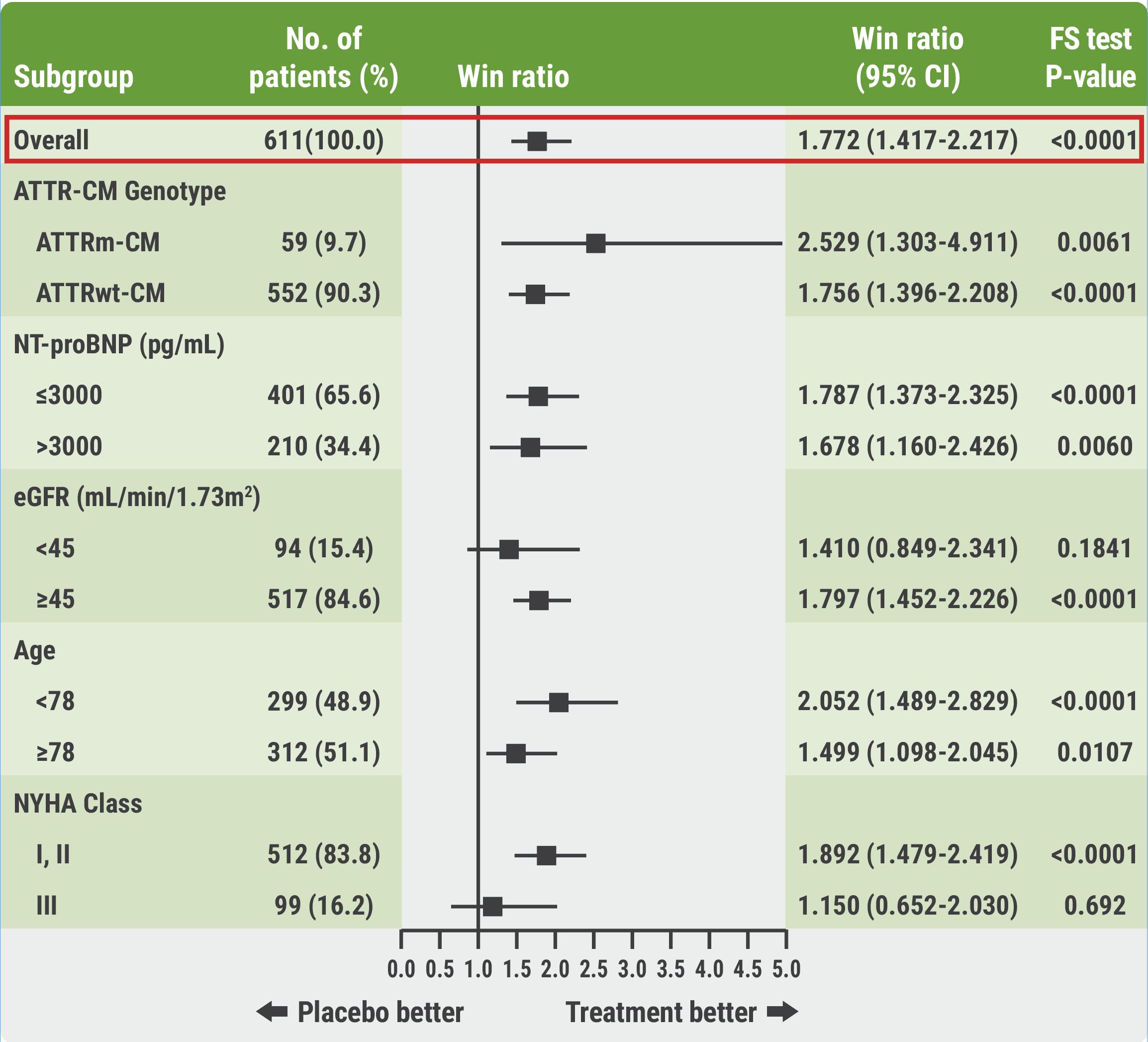https://doi.org/10.55788/39bcded8
Acoramidis is an investigational, orally administered agent that aims to stabilise tetrameric transthyretin. The phase 3 ATTRIbute-CM study (NCT03860935) randomised 631 participants with ATRR-CM (median age 78 years; 10% women; 10% variant TTR carriers) 2:1 to 800 mg twice-daily acoramidis or placebo [1]. Tafamidis use was allowed after 12 months and the primary endpoint was a hierarchical analysis of all-cause mortality, cumulative frequency of cardiovascular hospitalisations, change from baseline NT-proBNP, and change from baseline in 6-minute walking distance (6MWD). Prof. Julian Gillmore (University College London, UK) presented the findings.
At 30 months, the win ratio was 1.77 (95% CI 1.42–2.22; P<0.0001; see Figure) in favour of the acoramidis group, meeting the primary endpoint. In addition, participants on acoramidis saw a relative risk reduction (RRR) in all-cause mortality of 25%. For cardiovascular mortality, the RRR was even higher, at 30%. Furthermore, the relative risk for cardiovascular hospitalisation in the acoramidis arm was 0.50 compared with the placebo arm (95% CI 0.36-0.70; P<0.0001). There were significant differences in the other individual components of the primary endpoint as well, namely the change in NT-proBNP (ratio of adjusted geometric mean fold-change 0.53; 95% CI 0.463–0.604; P<0.0001) and change in 6MWD (least squares mean difference of 39.64 m in favour of acoramidis; 95% CI 21.07–58.22; P<0.0001).
Figure: Primary outcome overall and by subgroups [1]

The rates of treatment-emergent adverse events (TEAEs) were comparable for the acoramidis group (98.1%) and the placebo group (97.6%). Serious TEAEs appeared to be somewhat more frequent in the placebo arm (54.6% vs 64.9%).
Prof. Gillmore concluded that the ATTRibute-CM trial showed that acoramidis was safe and efficacious in patients with ATTR-CM, delivering survival and functional benefits for this population.
- Gillmore JD, et al. Efficacy and safety of acoramidis in transthyretin amyloid cardiomyopathy: results of the ATTRibute-CM trial. Hot Line Session 5, ESC Congress 2023, 25–28 August, Amsterdam, the Netherlands.
Copyright ©2023 Medicom Medical Publishers
Posted on
Previous Article
« Diagnostic tool doubles cardiovascular diagnoses in patients with COPD or diabetes Next Article
DAPT or clopidogrel monotherapy after stenting in high-risk East-Asian patients? »
« Diagnostic tool doubles cardiovascular diagnoses in patients with COPD or diabetes Next Article
DAPT or clopidogrel monotherapy after stenting in high-risk East-Asian patients? »
Table of Contents: ESC 2023
Featured articles
How to manage arterial thrombosis and thromboembolism in COVID-19?
2023 ESC Guidelines & Updates
Heart failure: the 2023 update
Guidelines for Acute Coronary Syndrome
Guidelines for the management of cardiomyopathies
Cardiovascular disease and diabetes: new guidelines
Guidelines for the management of endocarditis
Trial Updates in Heart Failure
Traditional Chinese medicine successful in HFrEF
CRT upgrade benefits patients with HFrEF and an ICD
Catheter ablation saves lives in end-stage HF with AF
Meta-analysis: Does FCM improve clinical outcomes in HF?
HEART-FID: Is intravenous ferric carboxymaltose helpful in HFrEF with iron deficiency?
Natriuresis-guided diuretic therapy to facilitate decongestion in acute HF
DICTATE-AHF: Early dapagliflozin to manage acute HF
STEP-HFpEF: Semaglutide safe and efficacious in HFpEF plus obesity
Key Research on Prevention
Does colchicine prevent perioperative AF and MINS?
Diagnostic tool doubles cardiovascular diagnoses in patients with COPD or diabetes
Inorganic nitrate strongly reduces CIN in high-risk patients undergoing angiography
Finetuning Antiplatelet and Anticoagulation Therapy
Should we use anticoagulation in AHRE to prevent stroke?
Results of FRAIL-AF trial suggest increased bleeding risk with DOACs
The optimal duration of anticoagulation therapy in cancer patients with DVT
DAPT or clopidogrel monotherapy after stenting in high-risk East-Asian patients?
Assets for ACS and PCI Optimisation
Immediate or staged revascularisation in STEMI plus multivessel disease?
Lp(a) and cardiovascular events: which test is the best?
No benefit of extracorporeal life support in MI plus cardiogenic shock
Functional revascularisation outperforms culprit-only strategy in older MI patients
Can aspirin be omitted after PCI in patients with high bleeding risk?
Angiography vs OCT vs IVUS guidance for PCI: a network meta-analysis
OCTOBER trial: OCT-guided PCI improves clinical outcomes in bifurcation lesions
Other
Minimising atrial pacing does not reduce the risk for AF in sinus node disease
ARAMIS: Can anakinra alleviate acute myocarditis?
Expedited transfer to a specialised centre does not improve cardiac arrest outcomes
Acoramidis improves survival and functional status in ATTR-CM
Related Articles
October 30, 2023
ARAMIS: Can anakinra alleviate acute myocarditis?
© 2024 Medicom Medical Publishers. All rights reserved. Terms and Conditions | Privacy Policy

